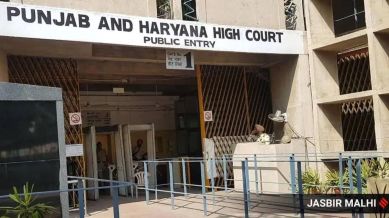Stay updated with the latest - Click here to follow us on Instagram
Punjab and Haryana HC refuses to quash FIR in Rs 42 lakh police job scam case, orders detailed probe
Justice Jasjit Singh Bedi said the complainant Gurmeet Singh, who was eventually named an accused in the case registered in Sirsa, cannot claim protection against self-incrimination.

The Punjab and Haryana High Court has dismissed a petition by Gurmeet Singh seeking the quashing of a First Information Report (FIR) and related proceedings against him in a Rs 42 lakh police recruitment scam case in Haryana.
The case was registered at Ellenabad police station in Sirsa in January 2017 on Gurmeet’s complaint alleging that six people induced him to pay Rs 42 lakh by promising his son a job as an assistant sub-inspector (ASI) in Chandigarh Police through alleged political and police links. After part payments, the deal collapsed and the accused allegedly threatened Gurmeet.
Years of litigation followed, leading to a Special Investigation Team (SIT) being formed earlier this year. The SIT named Gurmeet as an accused, citing his active role in the scam. The supplementary chargesheet invoked Indian Penal Code (IPC) sections 120B (criminal conspiracy), 406 (criminal breach of trust), 420 (cheating), 506 (criminal intimidation), and 109 (abetment), along with Section 8 of the Prevention of Corruption Act.
Justice Bedi held that there was no ground to quash the FIR or the supplementary report against Gurmeet. “The question of quashing of the FIR No. 0016 dated 18.01.2017… and the final report No. 1B dated 06.03.2025… qua the petitioner does not arise and the instant petition stands dismissed,” he held.
On Gurmeet’s argument that naming him as an accused violated Article 20(3) of the Constitution (protection against self-incrimination), the court clarified that this protection applies only after a person is formally accused.
“Any evidence provided by a person to the Investigating Agency during the course of an investigation can certainly be used against the said person in case he had not yet attained the status of an accused, which can only be attained when there is a formal accusation against him,” said Justice Bedi, citing Supreme Court rulings.
“In the instant case, the formal accusation against the petitioner was levelled only when the supplementary challan was submitted… Therefore, any material supplied by the petitioner prior to him attaining the status of an accused would not amount to self-incrimination and therefore, he cannot claim protection under Article 20(3),” the judge said.
Addressing the corruption charge, Justice Bedi clarified that Section 8 of the Prevention of Corruption (PC) Act covers private individuals as well: “An offence under the PC Act can be committed by either a public servant or a private person or a combination of both… The existence of a public servant for facing the trial before the Special Court is not a must and even in his absence, private persons can be tried for such offences, depending upon the facts of the case.”
The court also quashed the framing of charges against the other accused based only on the initial report and said further investigation must address the offence under Section 8 of the PC Act. It also directed that the trial court must consider all reports — initial, supplementary, and final — while framing the charges.